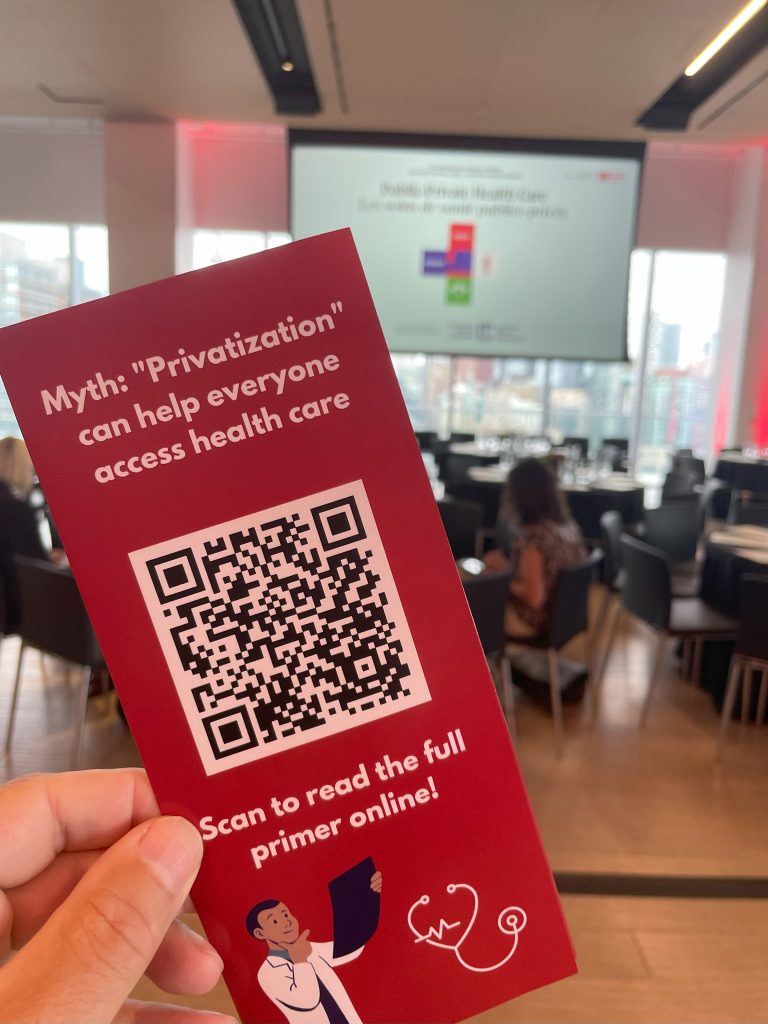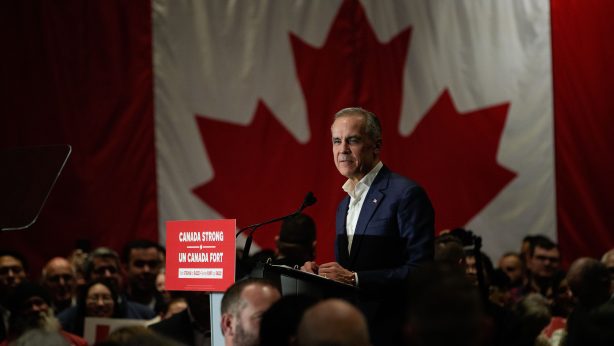The Canadian Medical Association’s cross-Canada town halls are pro-privatization, worry doctors
Beginning in the summer of 2023 and continuing into the winter, The Globe and Mail is promoting a series of town hall meetings entitled “Public-Private Health Care: Can we find the right balance?” in partnership with the Canadian Medical Association (CMA). The CMA is a national advocacy organization for physicians, and works closely with the provincial and territorial medical associations that represent physicians to their respective governments.
Discussion of “balance” hides real agenda of CMA town halls?
The online and in-person town hall meetings are advertised through full-page ads in the print edition of the newspaper as a conversation about the right “balance between public and private health care,” but there is something else happening.
The first town hall, which took place high atop The Globe and Mail’s tower in downtown Toronto, featured speakers and panels of many private for-profit health care companies for about 200 guests and hundreds more online.
Canadian Doctors for Medicare and Canadian Health Coalition at the CMA town halls
Dr. Melanie Bechard, member of the Canadian Medical Association and Co-Chair of the Canadian Doctors for Medicare (CDM), said, “The town halls hosted by The Globe and Mail and Canadian Medical Association were a missed opportunity to discuss real health system solutions. Instead they devolved into pro-private funding propaganda sessions.”
A letter to the CMA signed by over 400 hundred medical practitioners and students, including Dr. Bechard, and CDM Co-Chair Dr. Bernard Ho, expressed concern about the town halls saying it is important to differentiate between private funding versus privately owned delivery.
“Privately-delivered health care occurs in institutions that are not government-owned. This includes private not-for-profit facilities and private for-profit investor-owned facilities. This is where the majority of outpatient care is delivered in Canada,” says the letter. “Privately-funded health care is paid for by private supplemental insurance or out-of-pocket payments directly from patients. Private duplicative insurance is not permitted in Canada. Conflating these terms as ‘privatization’, whether deliberate or not, has important implications for the results of the CMA’s consultations.”
The discussion at the first town hall was crafted to deliver a message to doctors: the crisis in accessing health care provides a political opportunity to increase private, for profit-delivery of health care services. The topics, the journalists, the panelists, and even the questions posed to the guest speakers were careful to never undermine this central message.
“There was no discussion about the shortcomings of for-profit care, the added expense, the drain on providers from the public system, the risk of patients facing extra-billing and user charges from profit-driven clinic owners,” said Steven Staples, National Director of Policy and Advocacy for the Canadian Health Coalition, who attended.
The message of the CMA events is that the crisis in accessing health care provides a political opportunity for doctors to increase private, for profit-delivery of health care services.
Defeat of the privatizers in the courts with the Cambie case decision is back drop of CMA events
Observers suggest that the reason for this series of town halls is a desire by those who support for profit privately funded health care to come back from the resounding defeat of the Cambie case, spearheaded by Dr. Brian Day of Cambie Surgeries Corporation of Vancouver, BC.
The Supreme Court of British Columbia concluded that the introduction of duplicative private health (duplicating public health care services) would “have a direct negative impact on equitable access to necessary medical services” and would “…create a second tier of preferential healthcare where access is contingent on a person’s ability to pay”. The court reviewed key evidence and heard testimony from health policy experts from around the world. International scholars consider the Cambie case to have global implications. The BC Court of Appeal upheld the BC Supreme Court’s decision, and in April 2023 the Supreme Court of Canada declined to hear the appeal.
An impartial review of the evidence has ruled on the side of publicly-funded health care, time and again.
60 years ago, the CMA strenuously opposed the rollout of Medicare. It is disheartening that in these challenging times, when so many families are struggling to afford the basic costs of living, we need to watch our national physicians’ organization ask if patients should pay for health care. We hope that this time, the CMA will land on the right side of history.
Canadian Doctors for Medicare
Greg Marchildon, an expert on Medicare and professor emeritus at the University of Toronto, says there have been up to two dozen other forms of work-related action by doctors to demand changes to their fee schedules and to be able to extra bill.
Canadian doctors have gone out on strike to protest against single payer public medicare at least three times: in 1962 in Saskatchewan, 1970 when Quebec specialists walked off the job when the Quebec government was last to join medicare (they were forced off the picket line and back to work by the introduction of the War Measures Act) and in Ontario in 1986 when the doctors went out on strike to demand to be able extra bill.
A research paper comparing Belgium and Canada’s bitter doctors strikes co-authored by Marchildon and Klaartje Schrijvers concludes “…the Canadian Medical Association and its provincial chapters were effective in consolidating the gains and preventing subsequent governments from initiating further reform, in part because of the fear of another strike by physicians”.
Monique Bégin takes on the CMA in the 1980s
Canada’s universal health care system started unravelling in the 1980s with funding cuts. Doctors began to extra-bill patients, and the provinces were imposing user fees.
Monique Bégin, then federal Health Minister, who died on September 8, 2023, at 87, decided to act by proposing legislation with five principles of universal health care. The legislation also threatened to impose financial penalties on provinces that failed to abide by the 5 principles.
The Canada Health Act is Canada’s federal health insurance legislation and defines the national principles that govern the Canadian health insurance system: public administration, comprehensiveness, universality, portability and accessibility.
In The Globe and Mail’s obituary to Monique Bégin, writer Alan Freeman says the fight turned nasty. The then head of the Canadian Medical Association Everett Coffin referred to the Canada Health Act as “a rape of the spirit, if not the legal stipulations of the Canadian Constitution.”
In her memoirs Ms. Bégin recalled that provincial health ministers who opposed the measure ganged up on her at a federal-provincial meeting and attacked her using “vulgar words”.
Either Universal Medicare or Privatization
Bégin persisted. “Your philosophy is either universal medicare or it’s privatization,” she said in a radio interview at the time. “My philosophy is universal and you don’t negotiate philosophy.”
In the end, the legislation passed unanimously in the Commons in 1984, just prior to the election that saw the Liberals ousted from power and Ms. Bégin leave politics. “I’ve been called the saviour of medicare,” she later recalled. “But I just did my job.”
There are three more town halls planned by the Canadian Medical Association co-sponsored by The Globe and Mail featuring health reporters from the Globe, and moderated by André Picard. The next one is on Montreal on October 23, followed by an event in Vancouver on November 23 and a last one in Halifax on January 25.



